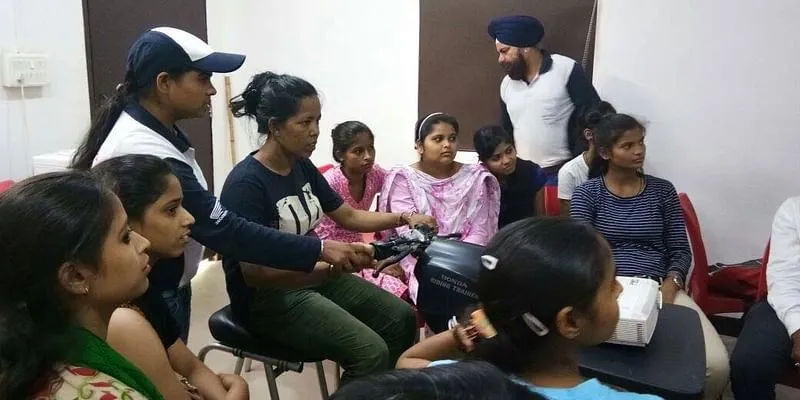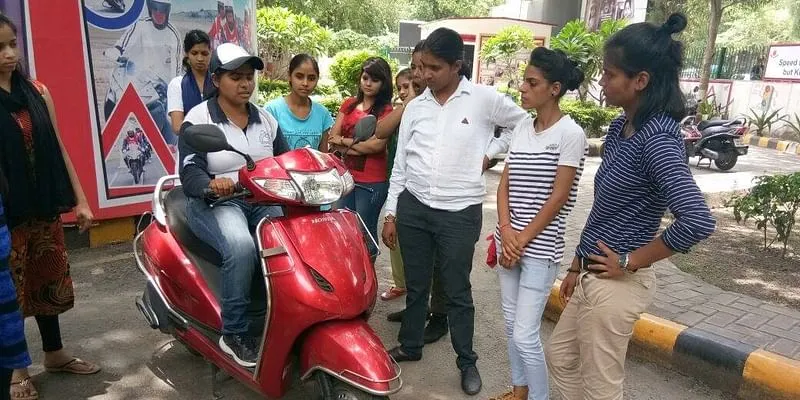How this B2B ecommerce logistics startup is empowering women to become delivery agents
Based in Delhi, B2B ecommerce logistics startup Even Cargo trains and empowers women from marginalised communities to become delivery agents in their hometowns.
Twenty-one-year-old Afreen lives in Nagpur. After her Namaz at 5 AM and finishing other household works, she is on her two-wheeler to collect packages for delivery by 7 AM. After delivering about 50 packages (or 100 on busier days), she is home by noon.
Afreen could not be happier with her job. She says, "Badi mushkil se yeh job karne ke liye bahar bheja gaya hai (It took a lot of convincing to go out and work.).”
Muslim women in her community are expected to be in burqas and not work outdoors. Her mother had even asked her to find a job where she can “work from one place and not constantly travel to houses.” Therefore, after Afreen returns from work, she does not step out at all.
Afreen is among 200 women who work with — a Delhi-based ecommerce logistics company — as delivery agents. The social commerce startup — founded by Yogesh Kumar to create more employment for women — is training over 300 women at present.
Even Cargo's delivery agents earn an average of Rs 20,000 every month, depending on the number of packages they deliver.
Started with a seed investment of Rs 5 lakh, Even Cargo was incubated at TISS for two years. The B2B logistics startup caters to ecommerce companies like Flipkart and Amazon. Present in seven locations, it is operationally profitable.

A training session in progress
The inspiration
In 2012, the Nirbhaya case shook all of India. Yogesh Kumar, an engineer, too, wanted to be a part of the solution and create safer public spaces for women.
He began by conducting gender sensitisation and awareness workshops among students and social communities. He also became a founding member of the then Delhi-based organisation Open Your Eyes.
In fact, he helped the local police by developing a platform that colour-coded the city’s map based on its safety, which determined safety levels by gathering unreported cases of catcalling, groping, and other harassment.
However, the collaborations turned out to be inefficient.
Yogesh soon realised that most of the interactions were confined to middle-class and well-off families. He wanted to address the challenges for people in the lower spectrum of society.
Seeing financial independence as a first step to reduce gender inequality, Yogesh decided to take the entrepreneurial plunge to create employment opportunities for women.
In 2016, he founded Even Cargo to run a ‘by women, for women’ cab service, but when the pilot test saw little success, it pivoted as an ecommerce logistics startup.
Six months after its launch, Karina Bhasin, a founding member of the startup, joined Yogesh. She was preparing for MBA when a brutal rape case of a young girl in Kathua sent shockwaves through the nation in January 2018. Post this incident, she decided to work in the area of gender, especially gender-based violence.
“The Kathua news was a really traumatising experience. When the Nirbhaya news broke out, I was in 10th Grade, and the most I could do was write poems, and did not know how to take action around it,” she adds.
Enabling women employment
In 2016, Even Cargo was looking at launching women delivery partners in a largely male-dominated field. For this, Karina spent time in urban slums with a team of volunteers and designed community-driven training modules based on their needs and challenges.
“For example, the two-wheelers training programme earlier used to happen at two training centres in Delhi. But, we realised some women had never travelled by metro and public transport. So, we turned to community parks for training centres. We asked them to rent or borrow vehicles from their male family members, who can then be part of the programme as trainers.”
Two years later, Even Cargo ventured into Tier-II cities like Nagpur, Jaipur, and Indore. After spending time in urban villages and slums, the startup adapted the training modules to the social culture of each geography.
It aimed at employing women in their native towns and cities and avoiding the need to migrate to metros.

(Even Cargo's training session on driving in progress)
“Nagpur only has one mall where women can seek work as a salesperson. They would have to travel to bigger cities for a job and earn a bare minimum of around Rs 10,000, including rental charges. Since this is not economical, women end up unemployed,” she explains, adding that charting new geographies goes beyond just ‘identifying’ women.
The startup regularly analyses gender-based violence reports, women's demographics, their employment status, access to gas stations, and ease of commute for women in different regions before talking to the local companies.
Karna says men working in warehouses should not perceive women delivery agents to be taking away their jobs when they are only claiming their share of the workforce. “They are not competitors but equal workforce partners,” she adds.
YourStory’s flagship startup-tech and leadership conference will return virtually for its 13th edition on October 25-30, 2021. Sign up for updates on TechSparks or to express your interest in partnerships and speaker opportunities here.
For more on TechSparks 2021, click here.
Edited by Suman Singh



![[100 Emerging Women Leaders] Why Pearl Agarwal came back to India and founded Eximius Fund after working in the likes of Merrill Lynch](https://images.yourstory.com/cs/4/a9efa9c02dd911e9adc52d913c55075e/PearlAgarwal800x400-1633874079719.png?fm=png&auto=format&h=100&w=100&crop=entropy&fit=crop)





